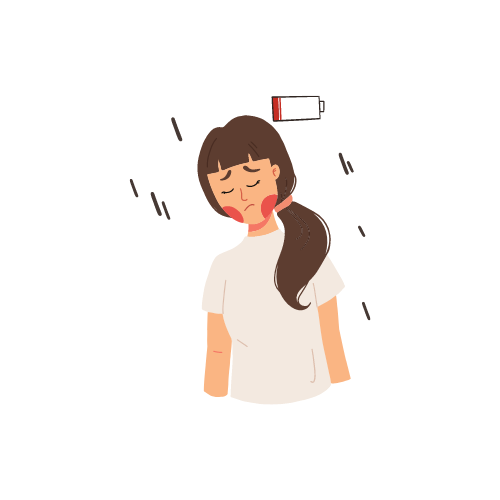ADHD and Boundaries in Communication | Kristen McClure, Therapist

What are Boundaries in Relationships?
Understanding Boundaries in Relationships Do you often feel overwhelmed or drained in your relationships? If you’re a woman with ADHD, this feeling can be even more intense. That’s where boundaries come in. Boundaries are the invisible lines you draw to define your personal space—where you end and others begin. They help clarify what is and isn’t acceptable behavior from the people in your life, whether you communicate them directly or through your actions. Unfortunately, many of us have been taught that setting boundaries isn’t our right. But the truth is, learning how to set and uphold them is a powerful act of self-advocacy. It’s a crucial coping skill that protects your energy and significantly reduces stress. Learning boundaries is a self-advocacy coping skill that will reduce your stress.What are the Different Kinds of Boundaries in Relationships?
Types of Boundaries and Why They Matter for ADHD Women Boundaries are essential for protecting your time, energy, and mental health. Here’s a breakdown of the different types of boundaries and how they can help, especially for women with ADHD who often struggle with people-pleasing and managing overwhelming situations. Physical Boundaries These are about your personal space, time, and privacy. They set clear rules, structure, and guidance for how others should respect your physical space, how you feel about being touched, and what happens if these boundaries are crossed. For ADHD women, who often deal with people-pleasing and executive functioning challenges, clear physical boundaries can help manage overwhelm and help them feel safe. Emotional Boundaries Emotional boundaries help you separate your feelings from others. They prevent you from feeling responsible for how someone else feels, which is crucial in protecting your emotional health. For ADHD women, often easily overwhelmed and deeply emphatic, these are vital, as we can often take on more emotional weight than we should. Energetic Boundaries These relate to the energy people bring into your life. If someone’s behavior or mood feels too overwhelming, energetic boundaries allow you to step back. This is crucial for ADHD women who are easily emotionally triggered and may struggle to regulate their feelings. Adhd women often need guidance with how to protect and manage their energy, which they often give away to people and projects. Mental Boundaries Mental boundaries protect your thoughts, beliefs, and opinions. They give you the confidence to express your ideas without worrying about criticism or judgment. For ADHDers, learning to honor these boundaries builds assertiveness and self-trust. Material Boundaries Material boundaries involve your belongings and money. They help you decide who you share these with and under what conditions. For ADHD women, this is especially important to avoid being taken advantage of in friendships or other relationships. Clear material boundaries provide the structure to help keep you safe and prevent unnecessary stress. By understanding and setting these boundaries, you take control of your life and protect your well-being.
Why is It Hard to Set Boundaries Amidst Challenges?
There are a few factors that can make it challenging to set boundaries:- Societal Expectations: Women are often taught to prioritize others’ needs over their own, which can create hesitation and fear of being seen as selfish or demanding when setting boundaries. ADHD and anxiety can make it even harder to push through this. However, deprogramming these ingrained messages is vital to foster healthy, authentic relationships and ensure mental well-being.
- Masking: This is the way neurodivergent women learn to survive in the world. You might often feel like you need to hide your true selves to avoid negative comments or judgments. This can make pleasing others seem like an urgent need.
- Rejection Sensitivity Dysphoria: ADHDers may be more sensitive to criticism and fear conflict or rejection when asserting their boundaries.
- Difficulty Identifying Personal Needs: Many women with ADHD struggle to prioritize their own needs due to family, parenting, masking, and issues like alexithymia. This makes it harder to establish and communicate boundaries effectively.
- Disconnect with Body, Emotions, and Feelings: Not being tuned in to your body signals makes it hard to know when to say no. This can result from societal expectations and learned behaviors.
- Low Self-Confidence: Women with ADHD may experience lower self-esteem and confidence, impacting their ability to assert their boundaries and advocate for their needs.
- Fear of Abandonment: Mostly, you might be afraid. What will happen if you try to change how you behave? What if people abandon you?
Things to do to Start Learning Self Care and Set Boundaries
- 🟢 Become Aware of Your Body Signals: Start noticing your body's signals when something isn't right. This can help you figure out when you need to set boundaries. Try activities like yoga, meditation, or body awareness exercises such as body scans or progressive muscle relaxation to get better at this.
- 🟢 Focus on Self-Care Over Societal Expectations: Don't worry too much about what others expect from you. Focus on taking care of yourself by setting limits on what you're comfortable with, asking for help when needed, and accepting that it's okay to make mistakes or have different opinions. Standing up for what you need is a key part of managing ADHD.
- 🟢 Engage in Regular Self-Care Practices: Take part in activities that support your physical, mental, and emotional health. This could include exercising, getting enough sleep, eating well, practicing mindfulness, or spending time on hobbies that make you happy and relaxed.
- 🟢 Develop Awareness of Emotional and Physical Responses: Pay attention to how you feel physically and emotionally as clues that a boundary might be needed. Practice saying "Yes" and "No" to connect with your bodily sensations and emotional reactions, which can help strengthen your understanding of your own boundaries.
- 🟢 Reflect on Past Experiences with Boundaries: Think about times when you felt good about asserting your boundaries and times when you felt they were crossed. Reflecting on these experiences can help you figure out how to handle similar situations in the future.
- 🟢 Accommodate Your ADHD Needs: Recognize the importance of accommodating your own ADHD-related needs and preferences. This means making adjustments for yourself that help maintain healthy boundaries and allow you to be more authentic in your daily life.
Six Steps and Strategies to Set Boundaries as an ADHD Women
| Step | Description | Examples/Questions |
|---|---|---|
| 1. Recognize When a Boundary is Needed | Identify signs of overwhelm, stress, or negative emotions like anger, frustration, or resentment. | Are you feeling overwhelmed in work, relationships, or social commitments? |
| 2. Get Specific About the Situation | Name the specific situation causing distress, using a journal or talking it through with someone you trust. | What exactly is causing this feeling? Can you write it down or discuss it with a trusted person? |
| 3. Determine the Context | Decide if the boundary involves someone close or if it is a general situation. | Is this boundary about a specific person (like a family member) or a general situation (like work)? |
| 4. Choose the Right Approach | Pick appropriate boundary-setting phrases based on the context (general situations vs. personal relationships). | General: "I appreciate the offer, but I have to decline." Personal: "I need space when conversations get heated." |
| 5. Communicate Clearly and Compassionately | Prepare for the conversation, using clear and compassionate "I" statements. | Plan what you want to say. Example: "I need to focus on my well-being." |
| 6. Follow Through and Reflect | Stick to the boundary, reflect on the outcome, and adjust as needed. | Did the boundary feel right? What did you learn? How can you adjust? |
Patience, Consistency, and Self-Compassion: The Keys to Healthy Boundaries
Learning to set and maintain boundaries in relationships isn’t something that happens overnight—it’s a process. It takes patience to figure out your limits, consistency to reinforce them, and self-compassion to give yourself grace when things don’t go perfectly.
Sometimes, you slip up or feel guilty for setting a boundary, and that’s okay. What’s important is that you keep trying, knowing that each small step brings you closer to healthier, more balanced relationships. Remember, it’s not about getting it right every time but about honoring your needs and showing up for yourself with understanding and kindness. By practicing patience and self-compassion, you’ll find it easier to communicate your boundaries and create relationships that respect your energy, time, and well-being.






